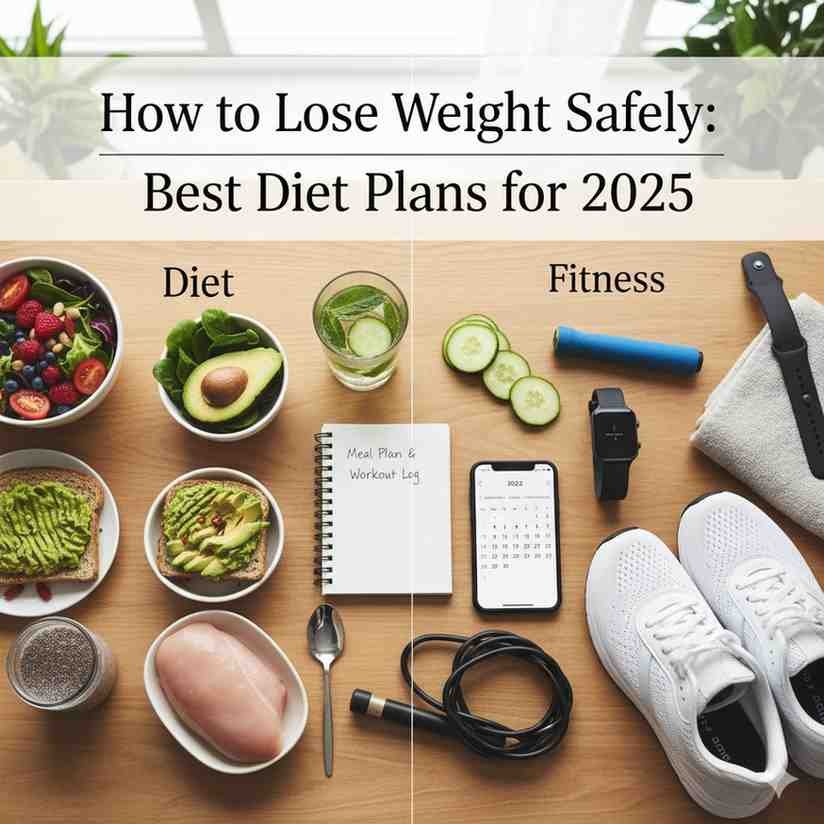
How to Lose Weight Safely: Top Diet Plans for 2025
The start of a new year often brings a renewed focus on health and wellness, with weight loss being a common goal for many. The desire to shed extra pounds is frequently driven by wanting to feel better, have more energy, and improve overall health. However, the internet is saturated with quick-fix promises and fad diets that can be ineffective at best and harmful at worst. True, sustainable weight loss is about adopting healthy habits, not just temporarily changing what you eat.
This guide will provide a clear, science-backed path to losing weight safely. We will explore what safe weight loss actually looks like, discuss the fundamental principles of nutrition and lifestyle that support it, and review some of the best diet plans projected to be effective and popular in 2025. Our goal is to give you the knowledge to make informed decisions that align with your body’s needs and long-term health objectives. By the end of this article, you will have a toolkit of practical weight loss tips to help you build a healthier relationship with food and your body.
Understanding Safe and Sustainable Weight Loss
Before exploring specific diet plans, it’s essential to understand what constitutes “safe” weight loss. Health experts generally agree that a gradual and steady pace is the most effective approach for long-term success.
What is a Safe Rate of Weight Loss?
A safe rate of weight loss is typically considered to be 1 to 2 pounds (about 0.5 to 1 kilogram) per week. Losing weight faster than this can lead to several problems, including:
- Muscle Loss: Rapid weight loss often comes from losing water weight and muscle mass, not just fat. Muscle is metabolically active, meaning it burns calories even at rest. Losing it can slow your metabolism, making future weight loss more difficult.
- Nutritional Deficiencies: Very low-calorie diets can make it challenging to get all the essential vitamins and minerals your body needs to function correctly.
- Gallstones: A common complication of rapid weight loss, affecting up to 25% of people who lose large amounts of weight quickly.
- Fatigue and Irritability: Extreme calorie restriction can leave you feeling tired, weak, and moody, making it hard to stick to your plan.
The key is to create a moderate calorie deficit—consuming fewer calories than your body burns—without depriving yourself of essential nutrients.
Core Principles of Healthy Weight Loss
Regardless of the specific diet plan you choose, certain principles are fundamental to achieving and maintaining a healthy weight. These form the foundation of any successful weight loss journey.
1. Calorie Deficit is Key
The most basic principle of weight loss is energy balance. You must burn more calories than you consume. A deficit of about 500 calories per day typically leads to a loss of approximately one pound per week. This can be achieved through a combination of eating less and moving more. Using a reliable calorie calculator can help you estimate your daily needs based on your age, gender, weight, height, and activity level.
2. Prioritize Nutrient-Dense Foods
Not all calories are created equal. To feel full and nourished while in a calorie deficit, focus on nutrient-dense foods. These are foods that are high in vitamins, minerals, and other beneficial compounds but relatively low in calories. Examples include:
- Lean Proteins: Chicken breast, fish, tofu, lentils, and beans help build and repair tissues and promote satiety.
- Whole Grains: Oats, quinoa, brown rice, and whole-wheat bread provide sustained energy and fiber.
- Fruits and Vegetables: Packed with fiber, vitamins, and antioxidants, they add volume to your meals with few calories.
- Healthy Fats: Avocados, nuts, seeds, and olive oil are crucial for hormone function and nutrient absorption.
3. The Role of Physical Activity
Diet is crucial, but exercise is a powerful partner in any weight loss plan. It not only helps you burn calories but also builds muscle, boosts your metabolism, improves your mood, and reduces your risk of chronic diseases. Aim for a mix of:
- Cardiovascular Exercise: Activities like brisk walking, running, cycling, or swimming for at least 150 minutes per week.
- Strength Training: Lifting weights or doing bodyweight exercises at least two days per week to build and maintain muscle mass.
4. Hydration and Sleep
Don’t underestimate the power of water and rest. Drinking plenty of water can help you feel full, boost your metabolism, and improve digestion. Aim for around 8-10 glasses per day.
Similarly, poor sleep is strongly linked to weight gain. Lack of sleep can disrupt the hormones that regulate hunger (ghrelin and leptin), leading to increased appetite and cravings for unhealthy foods. Aim for 7-9 hours of quality sleep per night.
Top Diet Plans for 2025
With the fundamentals in mind, let’s look at some of the best diet plans that are expected to be popular and effective in 2025. Each has a different approach, so you can choose one that best fits your lifestyle and preferences.
1. The Mediterranean Diet
Consistently ranked as one of the best diets overall, the Mediterranean diet is more of a lifestyle than a restrictive plan. It’s based on the traditional eating habits of people in countries bordering the Mediterranean Sea.
- What you eat: A high intake of fruits, vegetables, whole grains, legumes, nuts, and seeds. Olive oil is the primary source of fat. Fish and seafood are consumed regularly, while poultry, eggs, and dairy are eaten in moderation. Red meat and sweets are reserved for special occasions.
- Why it works: It’s rich in fiber, antioxidants, and healthy fats, which are great for heart health and managing weight. The focus on whole, unprocessed foods makes it naturally lower in calories and more filling.
- Best for: Individuals looking for a flexible, long-term eating pattern that focuses on overall health, not just weight loss. It’s one of the most sustainable and well-researched diet plans available.
2. The DASH Diet
The Dietary Approaches to Stop Hypertension (DASH) diet was originally designed to lower blood pressure, but it’s also an excellent plan for weight loss.
- What you eat: Similar to the Mediterranean diet, it emphasizes fruits, vegetables, whole grains, and lean proteins. It specifically encourages reducing sodium intake and limiting foods high in saturated fat and sugar.
- Why it works: By focusing on whole foods and limiting processed items, the DASH diet naturally creates a calorie deficit. Its structured nature, with clear recommendations for servings from each food group, can make it easier to follow.
- Best for: People who need to manage their blood pressure or want a structured, balanced eating plan with clear guidelines.
3. Intermittent Fasting (IF)
Intermittent fasting isn’t about what you eat, but when you eat. It involves cycling between periods of eating and fasting. The most popular methods include:
- The 16/8 Method: Fasting for 16 hours each day and restricting your eating to an 8-hour window (e.g., eating only between 12 PM and 8 PM).
- The 5:2 Diet: Eating normally for five days of the week and restricting calories to 500-600 on two non-consecutive days.
- Why it works: By limiting your eating window, you often consume fewer calories overall without feeling overly restricted during your eating periods. It can also improve insulin sensitivity and boost metabolism.
- Best for: Individuals who prefer not to count calories every day and find that a structured eating window helps control their intake. It may not be suitable for everyone, especially those with a history of eating disorders or certain medical conditions.
4. Plant-Based Diets (Vegan and Flexitarian)
Plant-based eating continues to grow in popularity, both for health and environmental reasons.
- What you eat:
- Vegan: Excludes all animal products, including meat, dairy, eggs, and honey.
- Flexitarian: A primarily vegetarian diet but occasionally includes meat and fish.
- Why it works: Plant-based diets are typically high in fiber and low in saturated fat, which can lead to weight loss. Focusing on whole plant foods like vegetables, fruits, legumes, and whole grains helps you feel full on fewer calories.
- Best for: Those who are passionate about animal welfare or the environment, or who enjoy a diet rich in plant foods. A flexitarian approach offers more flexibility for social situations.
5. Volumetrics Diet
The Volumetrics diet focuses on the energy density of foods. The idea is to eat more low-density foods, which have fewer calories per gram.
- What you eat: The diet categorizes foods into four groups based on density.
- Category 1 (very low density): Non-starchy fruits and vegetables, broth-based soups.
- Category 2 (low density): Starchy fruits and veggies, grains, legumes, lean protein.
- Category 3 (medium density): Meat, cheese, pizza, bread.
- Category 4 (high density): Crackers, chips, cookies, nuts, butter, oil.
You’re encouraged to eat mostly from Categories 1 and 2, have moderate portions from Category 3, and limit Category 4.
- Why it works: It allows you to eat large, satisfying portions of food while keeping your calorie intake low. This can help prevent feelings of hunger and deprivation that often derail weight loss efforts.
- Best for: People who struggle with hunger on other diets and prefer to eat larger volumes of food.
Forging Your Path to a Healthier You
Choosing the right diet plan is a personal decision. The “best” diet is the one you can stick with long-term. Consider your lifestyle, food preferences, and any health conditions you may have. It’s always a good idea to consult with a doctor or a registered dietitian before making significant changes to your diet. They can provide personalized advice and help you create a plan that is safe and effective for you.
Remember that weight loss is a journey, not a race. There will be ups and downs, but consistency is what leads to lasting results. Focus on building healthy habits, celebrating non-scale victories (like having more energy or your clothes fitting better), and being kind to yourself along the way. With the right approach and a positive mindset, you can achieve your weight loss goals in 2025 and beyond.
For more articles read here
- How to Download Your Telangana Family Member Certificate Soft Copy (FMC)
- Top 5 Indian Cities to Buy Property in 2025: Investment & Growth Guide
- 100+ Unique Anniversary Wishes for Everyone You Know
- Top 15 Best Indian Social Media & AI Apps (2025): Revolutionizing Bharat’s Digital Future
- 1000+ Happy Birthday Wishes for Everyone in Your Life









